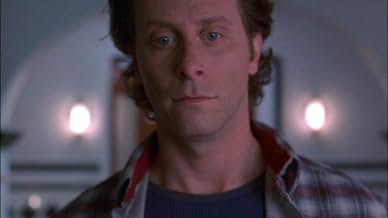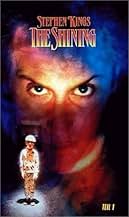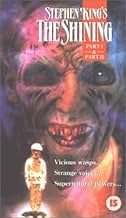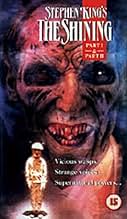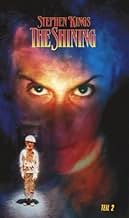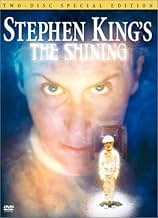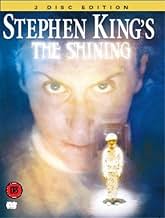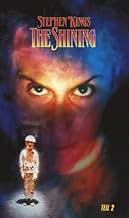A recovering alcoholic must wrestle with demons within and without when he and his family move into a haunted hotel as caretakers.A recovering alcoholic must wrestle with demons within and without when he and his family move into a haunted hotel as caretakers.A recovering alcoholic must wrestle with demons within and without when he and his family move into a haunted hotel as caretakers.
- Won 2 Primetime Emmys
- 15 wins & 10 nominations total
Browse episodes
6.119.7K
1
2
3
4
5
6
7
8
9
10
Featured reviews
A solid mini-series with its ups and downs
When I first saw this mini-series I thought it, despite being more faithful than Kubrick's film, was pointless and nowhere near as atmospheric. Watching it again, I think I was being unfair. I do consider Kubrick's film the superior and more atmospheric film overall(I shall never forget the Here Comes Johnny and Woman in the Bathtub scenes), but aside from being much more faithful to the book, which is excellent by the way but as far as King's works go I prefer It and The Stand, there are improvements made here. Jack's transformation is much more subtle, and his and Wendy's relationship is explored much further here. Rebecca DeMornay also is a far better female lead in my opinion, and Steven Weber brings a more human touch while being quite frightening too. The mini-series does look good, the photography and production values are fine, the sound and music are atmospheric, the story is compelling and the dialogue is mostly good. My complaints however are the overlong length, some of the CGI effects which were sometimes unnecessary and the pace is occasionally a little dull. Overall, it is a solid mini-series and much better the second time of viewing. 7/10 Bethany Cox
Definatly worth a watch
The 1997 version of The Shining is an excellent adaptation for fans of the book. For everyone else, it is entertaining but overshadowed by the uber-famous 1980 film (though to be honest, it's like comparing apples with Cadillacs). This film is best watched either three days in a row or all at once. Weber delivers a great performance as the haunted and tragic Jack Torrence and DeMornay surpasses Shelly Duvall in the role of Jack's patient but cautious wife, Wendy. Melvin Van Peebles is okay in the role of Hallorann but I found myself missing Scatman Crothers. Courtland Meade as Danny takes some getting used to, and I'll leave it at that. And even though it appeared on network television during sweeps, it contains a surprising amount of violence (especially during Jack's confrontation with Wendy in part three) and gore (especially in part two). Definatly worth a watch.
King vs Kubrick - A Comparison
Let me say this right off the bat, the Kubrick version is the superior movie while the King/ Garris version is the superior adaptation.
What's wrong with the Kubrick version?
His misses out on certain very important plot elements. Jack seems to be crazy from the beginning. Jack's alcoholism is not as known as it should be. The Overlook only seems to be haunted in one or two scenes, the rest could be cabin fever. The breakdown of the family is not so clear, Jack and Danny don't seem to really love each other as much as they should. Differs greatly from the book.
What's right with Kubrick's version?
Superior directing. A very definitive style. Classic scenes ("Here's Johnny!"). Excellent acting. Danny seems to really be his age. Wendy really seems to be scared. Jack really does seem crazy when he's supposed to be. A very good horror movie in general. The hotel is much more imposing. Foreboding music helps to set mood. Differs greatly from the book (I'll explain why it's in both later).
What's wrong with the King/Garris version?
It suffers from many TV-Movie problems. The actors aren't quite as good. They use CGI when puppets, wires, or trick camera shooting could be equally effective. CGI looks out of place. Danny talks like a twenty-year old, although the same problem was in the book. Jack is fine when it comes to being Mr. Every Dad but he doesn't seem to be crazy when he's supposed to be. Jack's transformation doesn't seem so gradual as it should, Wendy says "You're old drinking habits have all come back" when the book shows each one pop up. It's the book, very little is changed so if you've read the book you pretty much know exactly what happens.
What's right with King/Garris' version?
It's not a remake of Kubrick's movie, it's a movie version's of King's book. It's the book, if you loved the book and are a die hard fan you'll love this. Very little is changed. Minor subplots are changed but movie works well without them. You get pretty much everything the Kubrick version left out.
Which one?
It depends. If you loved the book and are a die hard Stephan King fan then watch the Garris TV miniseries. If you are a regular movie fan or a Kubrick fan then watch the Kubrick version. Garris' is for the book fans. Kubrick's is for the non book fans.
Final Thoughts.
It's not really fair to compare the two movies. Each one has their own pros and cons. Kubrick's is more of a movie using the basic premise of the haunted hotel and the father who goes crazy. It's meant to be a movie that's not just a page by page adaptation of the book. Which you got to admire Kubrick for doing that. He did something that even those who memorized the book would be surprised and scared. But Garris did something that the die hard Stephan King fans can love. It depends on who you are. It is definitely not fair to compare the two since they are both very different from each other. Both are good in their own separate ways.
What's wrong with the Kubrick version?
His misses out on certain very important plot elements. Jack seems to be crazy from the beginning. Jack's alcoholism is not as known as it should be. The Overlook only seems to be haunted in one or two scenes, the rest could be cabin fever. The breakdown of the family is not so clear, Jack and Danny don't seem to really love each other as much as they should. Differs greatly from the book.
What's right with Kubrick's version?
Superior directing. A very definitive style. Classic scenes ("Here's Johnny!"). Excellent acting. Danny seems to really be his age. Wendy really seems to be scared. Jack really does seem crazy when he's supposed to be. A very good horror movie in general. The hotel is much more imposing. Foreboding music helps to set mood. Differs greatly from the book (I'll explain why it's in both later).
What's wrong with the King/Garris version?
It suffers from many TV-Movie problems. The actors aren't quite as good. They use CGI when puppets, wires, or trick camera shooting could be equally effective. CGI looks out of place. Danny talks like a twenty-year old, although the same problem was in the book. Jack is fine when it comes to being Mr. Every Dad but he doesn't seem to be crazy when he's supposed to be. Jack's transformation doesn't seem so gradual as it should, Wendy says "You're old drinking habits have all come back" when the book shows each one pop up. It's the book, very little is changed so if you've read the book you pretty much know exactly what happens.
What's right with King/Garris' version?
It's not a remake of Kubrick's movie, it's a movie version's of King's book. It's the book, if you loved the book and are a die hard fan you'll love this. Very little is changed. Minor subplots are changed but movie works well without them. You get pretty much everything the Kubrick version left out.
Which one?
It depends. If you loved the book and are a die hard Stephan King fan then watch the Garris TV miniseries. If you are a regular movie fan or a Kubrick fan then watch the Kubrick version. Garris' is for the book fans. Kubrick's is for the non book fans.
Final Thoughts.
It's not really fair to compare the two movies. Each one has their own pros and cons. Kubrick's is more of a movie using the basic premise of the haunted hotel and the father who goes crazy. It's meant to be a movie that's not just a page by page adaptation of the book. Which you got to admire Kubrick for doing that. He did something that even those who memorized the book would be surprised and scared. But Garris did something that the die hard Stephan King fans can love. It depends on who you are. It is definitely not fair to compare the two since they are both very different from each other. Both are good in their own separate ways.
More of a Reinterpretation than a Remake
I have loved Kubrik's interpretation of The Shining since the first time it scared me. But that's what it really is, an interpretation. It's well known how Kubrik did his work and the limited amount of input that King had in the original movie. This new interpretation stays closer to the book and you genuinely get the idea that it's the hotel that is evil, while I've always felt that Kubrik's design made it feel more like the Jack went mad. The final scene of Kubrik's version, where he pans over the photos and you see Jack in all of them, has always felt like an homage to what the true meaning was supposed to be. This new version filled me with chills and goosebumps the whole way through. In one scene, when all the chairs in the dining area slide from their tables to the floor, not only was I shivering but I actually jumped. I've read the book; I knew it was coming but it was so perfectly executed that the creepiness was sustained throughout the entire show. That kind of horror/suspense is so rare nowadays, especially for a television mini-series! I truly feel that both versions stand on their own and applaud King for showing the chutzpah to go back and show us another view of The Overlook.
It's not Kubrick. But is is King.
Didn't hate it, but watched both this and the Kubrick version after reading the book.
Firstly, this is a TV show and not a movie - so lower your expectations slightly and enjoy it for what it is.
No doubt about it, this is a good version of King's vision. Love it or hate it, it's pretty faithful and I gotta say that you needn't overanalyse this to see that Steven Weber and Rebecca de Mornay did a good job playing the very average Torrance spouses, come on, give Weber some credit - those are some ridiculous shoes to fill after Jack Nicholson.
Danny was a miscast for me, but then again so was the kid in the Kubrick version.
So this doesn't get all the stars, but it does get some credit for leaning into the source material and busting a gut to 'rectify' (at least for Stephen King) the many omitted moments from the book in Kubrick's version... which is of course, in a different league.
We all know that - so haters, chill out and enjoy the fact that there are two versions of the story and there's no undoing that.
Firstly, this is a TV show and not a movie - so lower your expectations slightly and enjoy it for what it is.
No doubt about it, this is a good version of King's vision. Love it or hate it, it's pretty faithful and I gotta say that you needn't overanalyse this to see that Steven Weber and Rebecca de Mornay did a good job playing the very average Torrance spouses, come on, give Weber some credit - those are some ridiculous shoes to fill after Jack Nicholson.
Danny was a miscast for me, but then again so was the kid in the Kubrick version.
So this doesn't get all the stars, but it does get some credit for leaning into the source material and busting a gut to 'rectify' (at least for Stephen King) the many omitted moments from the book in Kubrick's version... which is of course, in a different league.
We all know that - so haters, chill out and enjoy the fact that there are two versions of the story and there's no undoing that.
Did you know
- TriviaStephen King: Author plays Gage Creed, the band conductor. Gage Creed is also the name of the 2-year-old boy played by Miko Hughes in Pet Sematary (1989), also based on a book written by King. King also had a cameo in Pet Sematary.
- GoofsReflected in the Overlook's main doors, behind Watson.
- Quotes
[Addressing the Overlook Hotel]
Dick Hallorann: Hello, you old bitch. You're just as ugly in wintertime as you are in summertime.
- Alternate versionsDVD contains 11 deleted scenes:
- Danny at the doctor's office; they briefly discuss Tony.
- Brief scene with Danny and Jack conversing.
- A brief scene where the Torrences step outside the hotel and observe that they are snowed in.
- A scene which originally occurred after the "217 lady" scene. Jack says that Wendy and Danny can leave the hotel ASAP and that he will stay. He also shows Wendy the lipstick he found, and describes how he believes Danny's strangle wounds were self-inflicted.
- A fireside chat between Wendy and Danny, in which he tells her that he hears the ghosts in the hotel, talking, laughing, and screaming.
- Two scenes which originally occurred after Jack is locked inside the vault. Wendy leaves Danny to get some food, and Danny tells her that he called to Dick. Then a scene in which Wendy returns and Danny says that Dick may not have heard him.
- A brief scene showing Grady releasing Jack from the vault, and Jack exiting and grabbing the mallet.
- A brief scene in which Danny encounters a female ghost, and he tells her he isn't afraid of her, that only his father can hurt him now. The ghost vanishes, and Jack then appears to "punish" him.
- A climatic ballroom scene in which the "party guests" and the orchestra all melt in gruesome fashion.
- An outtake featuring orchestra conductor Gage Creed (played by Stephen King) melting in gruesome fashion.
- ConnectionsFeatured in The 49th Annual Primetime Emmy Awards (1997)
Details
- Release date
- Country of origin
- Language
- Also known as
- Stephen King's The Shining
- Filming locations
- Production companies
- See more company credits at IMDbPro
- Runtime
- 1h 31m(91 min)
- Color
- Sound mix
- Aspect ratio
- 1.33 : 1
Contribute to this page
Suggest an edit or add missing content


